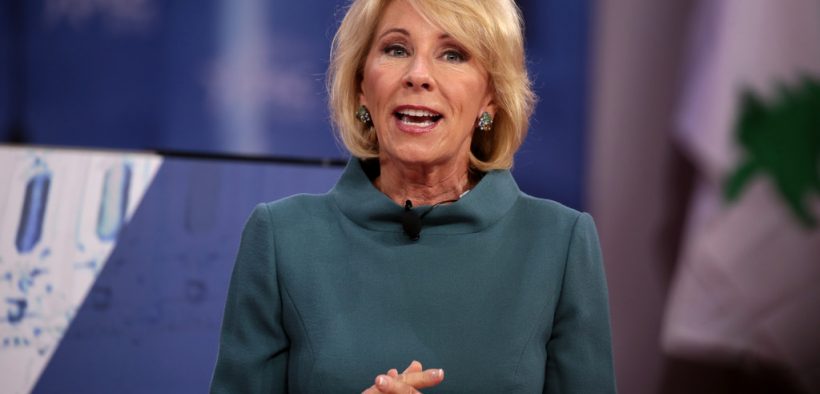Secretary of Education Betsy DeVos Revokes Obama Era Guidelines on Sexual Assault
Share

On September 7, US Secretary of Education, Betsy DeVos, announced the Trump administration’s intention to revoke the Obama Era Title IX guidelines regarding sexual assault. In her address DeVos strongly condemned acts of sexual violence as “reprehensible” and “unacceptable,” but criticized the guidelines saying, “Any perceived offense can be turned into a full blown Title IX investigation.”
DeVos made these intentions reality on Friday, September 22 when she announced the official rescinding of the Obama administration’s sexual assault directives. Once again she emphasized the administration’s commitment to both victims of sexual assault as well as the protecting the rights of the accused. “[The withdrawn documents] created a system that lacked basic elements of due process and failed to ensure fundamental fairness,” read statement released by the Department of Education.
To understand these changes, one must first understand Title IX and the Obama era guidelines issued in the famous (or infamous) “Dear Colleague” letter sent to over 7,000 colleges that receive public funding. Title IX was originally passed during the Nixon presidency to end discrimination that denied the benefits of education based on gender. This meant, among other things, that schools could no longer discriminate against girls in admittance practices and that equal funding had to be supplied for boys and girls sports.
Later in 2011, the Obama administration interpreted sexual assault as not just a crime, but as former vice president Joe Biden put it, “A violation of a woman’s civil rights.” As a result, the administration released the “Dear Colleague” letter, which required colleges to lower the standard of evidence used in sexual assault cases to a preponderance of evidence. Additionally, it told schools to speed up adjudications, to allow accusers to appeal not-guilty findings, and it discouraged the cross examining of accusers. Any college that did not follow these guidelines would run the risk of being charged with a Title IX violation and losing federal funding.
The greatest change that comes with the removal of the previous guidelines by the Trump administration is that schools can now alter the standard of evidence. This means that schools can require what DeVos referred to as a “clear and convincing” standard of proof in sexual misconduct cases where the accused can face life altering consequences such as expulsion. Aside from this, it is still unclear what else may come of this policy change, and how victims and accused students will be affected. Change will undoubtedly vary across schools, since the Trump administration has not released any new guidelines regarding these processes.
DeVos has garnered praise from across the political spectrum, most of whom regarded the Obama era guidelines as a threat to the due process rights of students. David French, a writer for The National Review praised DeVos and characterized campus hearings that follow the Obama presidency standards as kangaroo-courts exempt from constitutional rule. Prominent feminist academic and classical liberal Christina Hoff Sommers, who was skeptical of how Republicans would handle women’s issues applauded Devos’s “fair and transparent procedure.”
However, the actions taken by the Secretary have also drawn a fair deal of criticism. U.S. Representative Nita Lowey (D- New York) claims that this move by the Trump administration will only “delegitimize and suppress the voices of survivors.” Additionally, Stacey Long Simmons of the LGBT advocacy group National LGBTQ Task Force protested this policy noting that it was “particularly alarming” for LGBTQ students who face higher rates of sexual violence than others.
As alarming and/or confusing as this all may seem, I invite everyone to take a deep breath and relax. College campuses are some of the safest places to be in terms of sexual assault and rape. According to the Bureau of Justice Statistics, from 1995 to 2013 there were 20% fewer victimizations of college students compared to the general public (6.1 vs 7.1 per 1,000). As of writing this, The Megaphone has reached out but Southwestern’s administration has not yet confirmed how it will respond to the elimination of the previous guidelines. In the meantime, I would encourage faculty and students to engage in an open and respectful dialogue about this new policy and the SU community.
